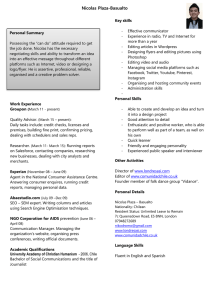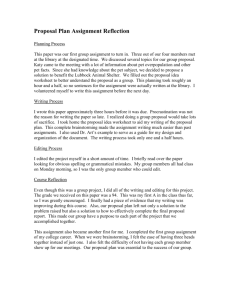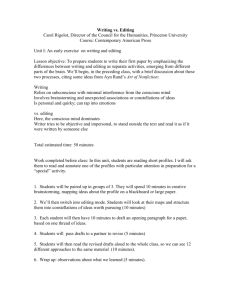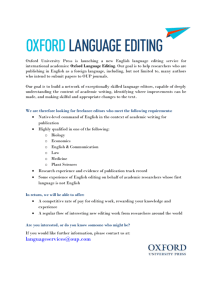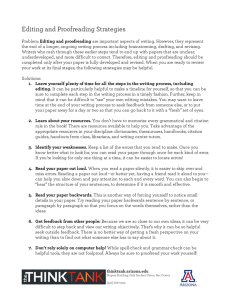(
advertisement
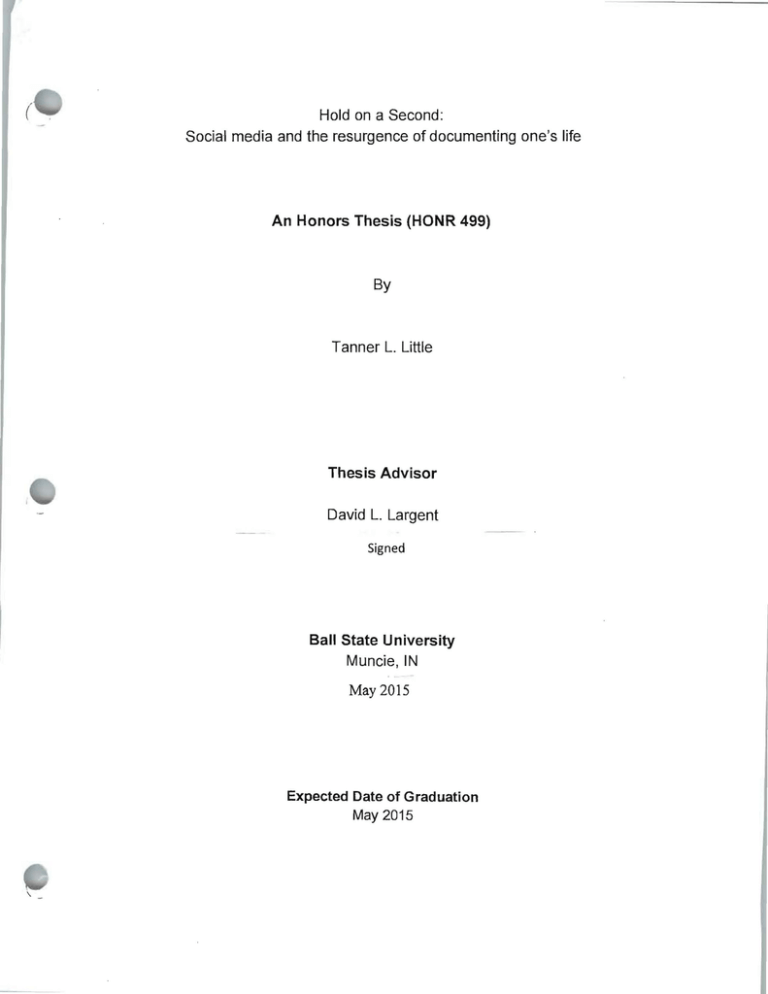
( Hold on a Second: Social media and the resurgence of documenting one's life An Honors Thesis (HONR 499) By Tanner L. Little Thesis Advisor David L. Largent Signed Ball State University Muncie, IN May 2015 Expected Date of Graduation May 2015 '-...J ? Abstract: c . Z'/ - CI5" . L5fj The notion of chronicling , whether it be facilitated through journal, diary, log, or other means, has helped to map the past. Today, social media and other digital platforms are helping to do the same for the future . Such technologies are quickly reworking the landscapes of our lives. These tools can be used to promote introspection and offer a degree of accessibility that is unparalleled . Hold on a Second discusses the theory behind this concept, while simultaneously exploring this idea in action. Acknowledgments: I would like to thank David Largent for his full support, understanding, and encouragement. His uncanny ability to ask the right questions throughout my studies and research has proved invaluable. This project would not have been possible if not for both his passion and counsel. 1 Author's Statement: On January 19, 2014 I decided to explore the idea of self-documentation in an ever-increasingly connected world. My inspiration for this venture came from a very simple idea. That is, people are no longer writing in journals, diaries, or other physical media in the same manner that was common of previous generations . However, digital platforms such as social networking, blogs, and streaming services are being used for much the same purpose. Such mediums outshine traditional pen and paper on several fronts, including ease of use and accessible sharing. This trend of having a presence online is obviously happening. But why are people electing to document their lives on the web? Or in other words , what do they get out of it? Is this simply a matter of self-fulfillment? Do people merely wish to share their personal views and experiences? Or perhaps, is there something more to be said about self-documentation? Ultimately, these questions evoke a very personal response. As such , I decided to document my own life. The process of doing so helped me to better understand the principles of self-documentation as well as myself. My agenda was rather simple. I captured one second video clips every day over the course of a calendar year. These snapshots into my life were originally created without the intent of being scripted or structured. Instead, I opted to simply record what I felt to be the best representative moment of any given day's experiences . I used the modest 5MP camera of my smartphone to record content. Some days would have more video captured than others and yield a lot of footage to be left unused in the editing 2 studio; nevertheless, each day was approached with the intent of recording at least one meaningful second. Editing was facilitated through several digital tools . Most importantly, video editing was completed through a combination of Adobe Premiere and Windows Movie Maker. Meanwhile, audio editing was tackled with the help of Avid Pro Tools. The resultant combination of these two forms can be found in an easily accessible video. Methodology and background serve to aid in forming expectations and understanding for a project . However, they lack a personal touch . They do not relay the reflection process, or personal significance that can be found through self-documentation. Admittedly, these reflections will vary from individual to individual. What is significant to one person may very well be insignificant to another. Nevertheless, when one factors out personal bias, several universal concepts arise from the practice of self-chronicling. First off, this type of project promotes self-awareness. I set out with the intention of producing something to be viewed by a larger audience. And as a response, I felt an obligation to produce something that was at least mildly interesting. After all, it would be extremely disheartening to invest a significant amount of time and resources into a project that could not be handled with pride. Ultimately, this self-awareness helped to shape and embolden the life that I was actively living. The prospect of capturing a meaningful second on any specific day worked as a catalyst in my own life. I have danced where I previously would have sat; 3 and I have sat in places that I never would have bothered visiting if not for the pursuit of documenting something meaningful. This encouragement, paired with the idea of self-chronicling, produced something that I had not expected -- a different outlook on life. I have since shared this project with others and have been quite surprised by their reactions. Almost universally, people reply with a comment to suggest that their life is, by comparison, mundane. However, I contest that point and, in fact, propose the exact opposite . Self-documentation, such as Hold on a Second, fosters a mentality of living a more exciting life, or at the very least, enables the author to become more aware of the highlightable moments in their own life. Personally, this experience has proven to be a source of encouragement and somewhat cathartic in nature. However, this idea extends much further than myself. Whether it be premeditated or simply a product of one's actions, documentation is on the rise. Ultimately, social media and other digital platforms are helping to facilitate this phenomenon . Personally, this project resulted in much more than I had originally anticipated. I achieved the objectives that I had set out to address, but I also stumbled upon items that I could not have predicted. Yes , I gained a greater understanding of social media and documentation at large. In addition, I have a newfound respect for self-chronicling and the benefits that it presents to its participants . However, I also had the opportunity to explore myself throughout my year of documentation . As mentioned previously, the process of reflecting on your life daily promotes a certain degree of self-awareness. Through this , it becomes very easy to view the 4 places, events, and people that you deem to be fundamental factors in your life. My interactions with others, appreciation for my environment, and even self-appraisal were framed through this process. Ultimately, I find that such an experience , even if happened upon by chance, is invaluable. The legacy that is left by the current generation will likely not be written on paper - nor will it necessarily be written posthumously. The collective masses are, without encouragement or filter, actively writing their own memoirs. 5
